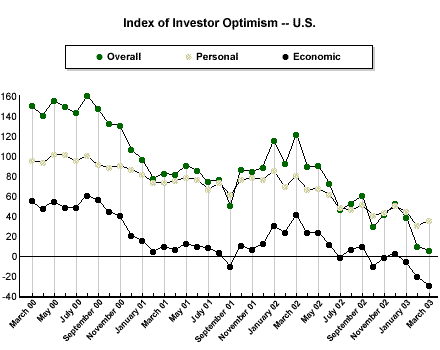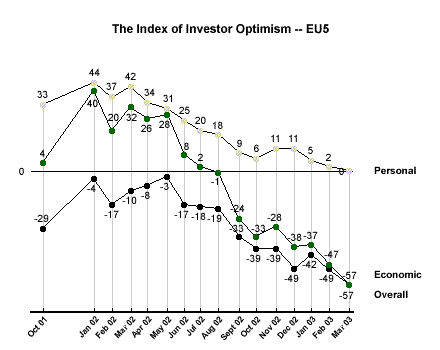The potential for a political "war rally effect" is obvious: Gallup's latest poll (March 22-23) shows that President Bush's overall approval rating has increased to 71% from 58% a week ago, and 72% of the public now supports the war with Iraq. The potential for a similar economic rally effect is best reflected by the fact that the stock market -- although very volatile -- had its best week in 20 years last week.
Does this mean that investor optimism will surge in the months ahead? Would that surge be enough to jump-start the world economy? While economists may disagree on these questions, they all must acknowledge that the world's investors are much less optimistic than they were a year ago.
Investor Optimism Falls to New Lows
Before the invasion of Iraq in mid-March, investor confidence in the United States and Europe fell to new lows, according to the Gallup/UBS Index of Investor Optimism*. The Index of Investor Optimism -- U.S. is now at 5, its lowest point since its inception in October 1996. The Index of Investor Optimism -- EU5 is at -57, also its lowest point since European measurement began in October 2001.
Over the past year, both Indexes have plunged:
- The U.S. Index was at 121 in March 2002 and is now at 5 -- a decline of 116 points in 12 months.
- The EU5 Index was at 32 in March 2002 and is now at -57 -- a decline of 89 points.
Last year at this time, 27% of U.S. investors said it was not a good time to invest in the financial markets. This month, 56% of U.S. investors say it is not a good time to invest. Over the same period, the percentage of European investors saying it is not a good time to invest increased from 50% to 67%.
U.S. Investors Are Pessimistic About the Economy
U.S. investors continue to be much less optimistic about the national economy overall than they are about their personal financial statuses. The Personal Dimension of the U.S. Index actually increased five points in March to 35. This is up from its February low of 30, but is about half of its March 2002 level (80). The fact that the Personal Dimension remains positive suggests that investors are still optimistic overall about their personal financial situations.
The Economic Dimension of the U.S. Index fell nine points to -30 -- its lowest level ever. The Economic Dimension was at -11 in September 2001 and -21 in February, and is now far below where it was a year ago (41). This suggests that investors are pessimistic overall about the economic outlook for the next year.

EU5 Investors Are Also Pessimistic About the Economy
In March 2002, the Index of Investor Optimism -- EU5 (conducted in five European countries: France, Germany, Great Britain, Italy, and Spain) was at 32 -- not far below its October 2001 benchmark of 40. As in the United States, European optimism trended downward throughout 2002, reaching a low of -38 in December, and now stands at -57. Unlike U.S. investors, Europe's investors are pessimistic overall about the current investment climate and have been so since September 2002.
EU5 investors are highly ambivalent about their personal situations -- thus, the Personal Dimension stands at a neutral 0. Europe's investors, however are even more pessimistic than U.S. investors along the Economic Dimension (-57).

An Economic Jump-Start?
The equity markets are riding a wave of emotion. Nearly half of U.S. investors (47%) and more than half of European investors (58%) think the war with Iraq is the greatest threat to the current investment climate. Another 20% of U.S. investors and 14% of EU5 investors point to the potential for a terrorist attack. Reducing these threats will certainly boost investor expectations.
Assuming the war goes fairly well over the next couple of weeks, we can expect investor optimism to surge upward from its pre-war March lows, as it did following Sept. 11, 2001. The better the war with Iraq appears to be going and the more rapidly investors expect it to conclude, the more likely and more significant will be the economic rally effect.
Will such a surge in investor confidence jump-start the world economy? Sixty-one percent of U.S. investors say that the U.S. economy has not hit bottom. More importantly, while 40% of U.S. investors think the war in Iraq will have a positive effect on the economy, 51% believe it will have a negative effect.
Removing the fog of war will provide a short-term boost in confidence and give consumers and businesses a clearer view of how the real economy is doing. Unfortunately, the resulting increase in clarity is very likely to shed light on factors that discourage investors -- not encourage them -- when it comes to spending and investing in the months ahead.
*Results for the Index of Investor Optimism -- U.S. are based on telephone interviews with a randomly selected U.S. sample of 1,001 adult investors, aged 18 and older, with at least $10,000 of investable assets, conducted March 1-12, 2003. Results for the Index of Investor Optimism -- EU5 are based on randomly selected samples of approximately 200 investors each in France, Germany, Great Britain, Italy, and Spain conducted March 1-16, 2003. For results based on these samples, one can say with 95% confidence that the maximum error attributable to sampling and other random effects is ±3%. In addition to sampling error, question wording and practical difficulties in conducting surveys can introduce error or bias into the findings of public opinion polls.

